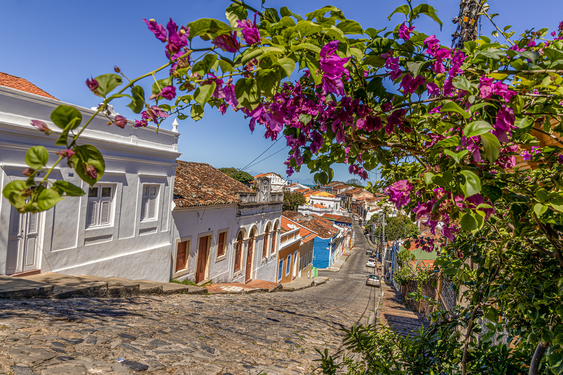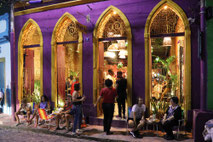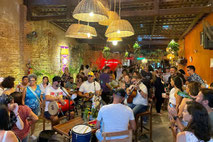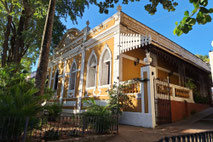Olinda - A picturesque town
The richest city in colonial Brazil in the 16th and 17th centuries

Olinda, the impressive baroque city, was founded in 1535. It is more of an open-air museum than an ordinary city. The baroque treasures from the colonial era are numerous. For centuries, sculptors, painters and theatres have shaped the cityscape. Even today, Olinda attracts Brazil's creative artistic class. The picturesque lanes of the old town are lined with 70 studios and art shops just waiting to be discovered. The many interesting bars and restaurants are full of charm. Brazilian musicians with pandeiros and guitars playing typical street songs complete the lively cityscape.
Olinda – a baroque city full of masterpieces
When the city's founder, Duarte de Coelho Pereira, stood on the hill Alto da Sé and marvelled at the view, he is said to have exclaimed: ‘Ó linda!’, ‘Oh how beautiful’. This evolved into the name
Olinda, ‘The Beautiful’.
The baroque city is considered one of the oldest and best-preserved colonial cities in Brazil. It was the home of the Portuguese aristocracy. In the 16th and early 17th century, it was the most
prosperous city in colonial Brazil. It was also called ‘Little Lisbon’ because it was comparable to the capital of Portugal.
The panoramic view of the sea with the skyline of Recife is unforgettable, and not only for fans of culture and architecture.
A journey through the history of Olinda
Olinda experienced its architectural boom at the beginning of colonisation and became the global centre of the sugar cane trade in South America. The city, with a population of 349,970, was
awarded UNESCO World Heritage Site status in 1982. It was the second city in Brazil, after Ouro Preto, to receive this status.
Olinda was built on hills along the Atlantic for defence, 7 km from Recife. Although Recife dominated the port and the economy, Olinda was the seat of colonial Brazil in 1624/25.
Olinda remained prosperous until the Dutch invasion under the captain of Pernambuco. The Dutch made the region Dutch Brazil from 1630 to 1654. On 24 November 1631, the Dutch army burned Olinda to
the ground. They began building their own houses in the new capital, present-day Recife. To demonstrate their power, they named the first new houses New Holanda; later the city was officially
named Mauritsstad.
After the reconquest by the Portuguese in 1654, the administrative centre was moved back to Olinda.
Despite its history, the lords of Recife fought against Olinda's aristocracy. They won and claimed the title ‘capital of the province of Pernambuco’, which had been part of the Empire of Brazil
since 1821. Olinda lost its importance, and Recife became the capital of the province of Pernambuco in 1827. Olinda's former role was finally lost.
Nightlife – the sister of artists
Olinda is not just about architecture and studios. Olinda has a vibrant art and music scene that comes to life at dusk. In few Brazilian cities is the cultural enthusiasm as great as here. Art,
culture and music determine a large part of life.
On balmy nights, people sit relaxed in bars, meet friends, philosophise and listen to music. The mood is exuberant, no one thinks about work; they live in the moment. The nights are romantic and
fascinating.
The ‘Bodega de Véio’, known as a meeting place for the art scene, or the ‘Bar do Amparo’ are just two of the many nocturnal attractions of Olinda. Almost every day there are street parties or jam sessions on the sidewalks.
Carnival of the gigantic puppets and the Frevo orchestras
Recife and Olinda are rival sister cities. Each wants to be the better of the two. This is particularly evident during Carnival.
In Recife, there are many multicultural activities such as concerts and private parties. Olinda offers a street carnival where Frevo orchestras parade through the historic centre. The highlight
is to follow them. Just go with the flow! This direct contact with the people makes the carnival in Olinda a special and unique experience.
The ‘Bonecos de Olinda’ are special. These giant puppets made of papier-mâché are often over two metres tall and announce a carnival block. Up to a million people and over 500 groups celebrate in
the street carnival in Olinda.









